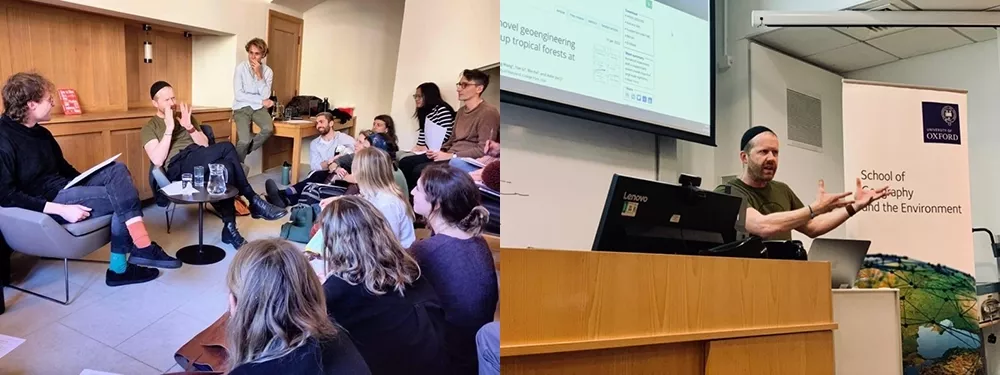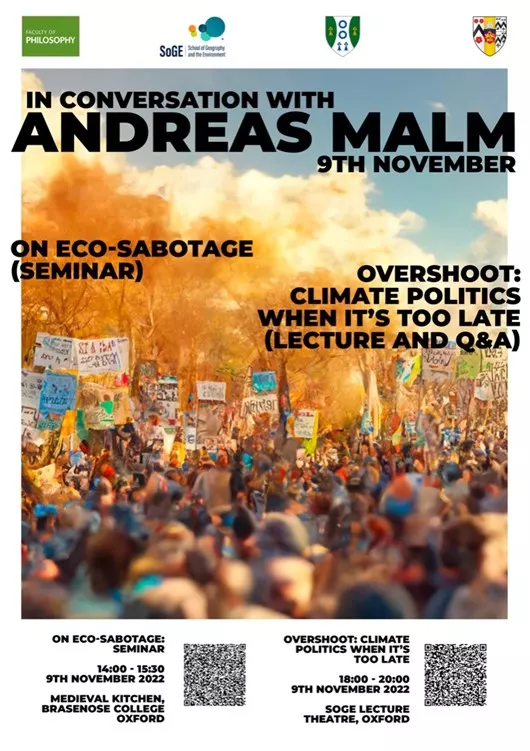Andreas Malm at SoGE
A year ago, on November 9th 2022, the Economy and Society Research cluster, in partnership with the Faculty of Philosophy, hosted Andreas Malm, climate activist, to speak on eco-sabotage and on his latest research on the politics of overshoot.

Andreas Malm is an associate professor of human ecology at Lund University. As a researcher and climate activist, he radically revisited 19th century politics in the transition from hydropower to coal in his already seminal book Fossil Capital (2016). Since, Malm has published prolifically, addressing topics such as: the nature-society nexus in The Progress of this Storm (2017), the role of the State in times of crisis in Corona, Climate and Chronic Emergency (2020), the far right and fossil fascism in White Skin, Black Fuel (2021), and the moral justification of eco-sabotage in How to Blow Up a Pipeline? (2020). Associated with activist outlets such as Ende Gelände and the Zetkin Collective, he works in dialogue with radical wings of the climate movement in Europe. With the support of the Faculty of Philosophy as well as the Economy and Society Research Cluster at the School of Geography and the Environment (SoGE), Andreas Malm came to Oxford on the 9th of November 2022.
The seminar on the "Philosophical Justification of Eco-Sabotage", moderated by Alexandra Aaridge (DPhil Philosophy, St Anne's college) and hosted by Brasenose College, questioned whether eco-sabotage was a logical, necessary, justified and proportional form of climate activism and whether it would need to be escalated in order to avoid climate collapse.
His lecture on "Overshoot: Climate Politics When It's Too Late", moderated by Elvina Crowe and Andrew Fowler and hosted at the School of Geography and the Environment, discussed emerging strategies for managing so-called overshoot, or the breaching of the 1.5 - and quite possibly also 2 - degree targets. Dominant classes have now accepted such global warming as a virtual fait accompli. So what are we supposed to do when temperatures exceed these critical thresholds? Three strategies are on offer: adaptation to cope with the disasters, carbon dioxide removal to bring the CO2 concentrations back down, and solar geoengineering to shave off the peak of the heat. This lecture delt with the illusions, pitfalls, and dangers of all three, but focused on carbon removal and its emerging political economies. The argument was then critically extended into a discussion on the ethical and practical responsibilities of scholar activism and ways in which academics can mobilize research about social transformation and infrastructural inequalities to help forge a more just world.
The event co-organizers published an article on Malm's visit in the Oxford Review of Books (accessible online). A year later, these questions are still as relevant as eco-sabotage is considered as a politically salient strategy in a context of overshoot.
The School of Geography and the Environment, in collaboration with the Faculty of Philosophy, co-organised the event. Representatives from SoGE included Dr Ariell Ahearn (Co-Chair of the Dana Standing Committee and co-organiser of the event) and cross-departmental students: Wallerand Bazin (DPhil SoGE), Elisabeth Darrobers (DPhil Literature, Sorbonne), Sasha Aaridge (DPhil Philosophy, Oxford), Elvina Crowe (MPhil SoGE) and Andrew Fowler (MSc SoGE).

Andreas Malm at SoGE
A year ago, on November 9th 2022, the Economy and Society Research cluster, in partnership with the Faculty of Philosophy, hosted Andreas Malm, climate activist, to speak on eco-sabotage and on his latest research on the politics of overshoot.





